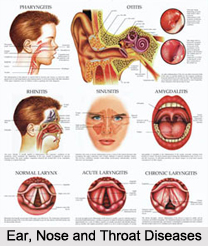 The ears, nose and throat are important parts of a body that are used on a daily basis. ENT is a medical abbreviation for Ears, Nose and Throat. A doctor who specializes in treating these disorders is called an "ENT", or less commonly an Otolaryngologist. ENT doctors are comfortable treating any disease involving the ear, nose and throat.
The ears, nose and throat are important parts of a body that are used on a daily basis. ENT is a medical abbreviation for Ears, Nose and Throat. A doctor who specializes in treating these disorders is called an "ENT", or less commonly an Otolaryngologist. ENT doctors are comfortable treating any disease involving the ear, nose and throat.
The ears, nose, and throat have separate but related functions. The ears and nose are sensory organs, which are necessary for the senses of hearing, balance and smell. The throat mainly functions as a pathway through which food and fluids travel to the oesophagus and air passes to the lungs.
These parts of the body are actually the upper end of the airways system and are prone to viral infections, particularly in the colder months. There are also some common conditions affecting them such as ear wax, hearing loss in older people and vertigo.
Here are some examples of ENT disorders:
•Tonsillitis: Tonsillitis is inflammation due to infection of the tonsils with symptoms like sore throat, fever, pain with swallowing, headache, runny nose, hoarseness, ear pain, etc. It is usually caused by a viral infection or, less commonly, a bacterial infection.
•Ear Infections: Ear infections occur when germs enter the ear and become trapped there. Symptoms of ear infections include pain, hearing loss, balance problems and drainage from the ear. Small children are more likely to have ear infections.
•Sinus Infections: Sinuses are cavities in the skull that surround the eyes and nose and are responsible for vocal resonance. Sinusitis occurs when these cavities become infected by a bacteria or virus.
•Sleep Apnoea: Sleep apnoea is a brief cessation of breathing while asleep. It can occur in both adults and children. Overweight, enlarged tonsils or other structures in the nose and throat or having a naturally shorter airway than usual are some of the causes of Sleep Apnoea. If left untreated, sleep apnea can cause heart failure, depression, mood changes and other diseases.
Other ENT disorders include hearing loss, vertigo, acid reflux, cancers of the ear, nose and throat and many more.




















